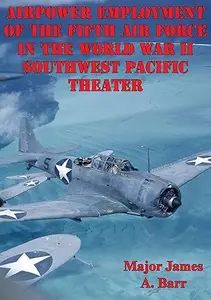
Free Download Major James A. Barr, "Airpower Employment Of The Fifth Air Force In The World War II Southwest Pacific Theater"
English | 2014 | ASIN: B06XGKJPPD | EPUB | pages: 56 | 0.3 mb
This research project studies the employment of airpower by the Fifth Air Force, under Gen George C. Kenney, in the Southwest Pacific Theater during World War II. The research began with two basic assumptions. First, it assumed that the strategic bombardment theory developed by the Air Corps Tactical School in the 1930s was the definitive doctrine of the Air Corps upon entry into World War II. Second, it assumed that General Kenney and his staff were required to develop a new doctrine for airpower employment since the situation in the Southwest Pacific did not lend itself to strategic bombardment of the Japanese industrial web. The research process proved both of these assumptions invalid.
Study of historical records, personal accounts, and subsequent historical writings in several areas revealed that there was no clear and consistent doctrine for the employment of airpower...
General Kenney assumed command of the Fifth Air Force with a clear vision of how to employ air forces to defeat the enemy. His diverse background gave him a balanced view of the roles airpower should play, and he was not convinced by the strategic bombardment theory that claimed invincibility for the bomber. His World War I experiences and teachings at the Air Corps Tactical School provided a strong belief in the importance of air superiority and attack aviation. He was innovative in modifying tactics and equipment, and in developing new roles for airpower as the situation dictated...
This study surveys the development of airpower doctrine beginning with World War followed by major developments during the interwar period in several arenas. It then looks at the varied aspects of Gen George C. Kenney's career which prepared him to command the Fifth Air Force in the Southwest Pacific Theater during World War II. Finally, it considers General Kenney's employment of airpower in light of the pre-war doctrine development.
